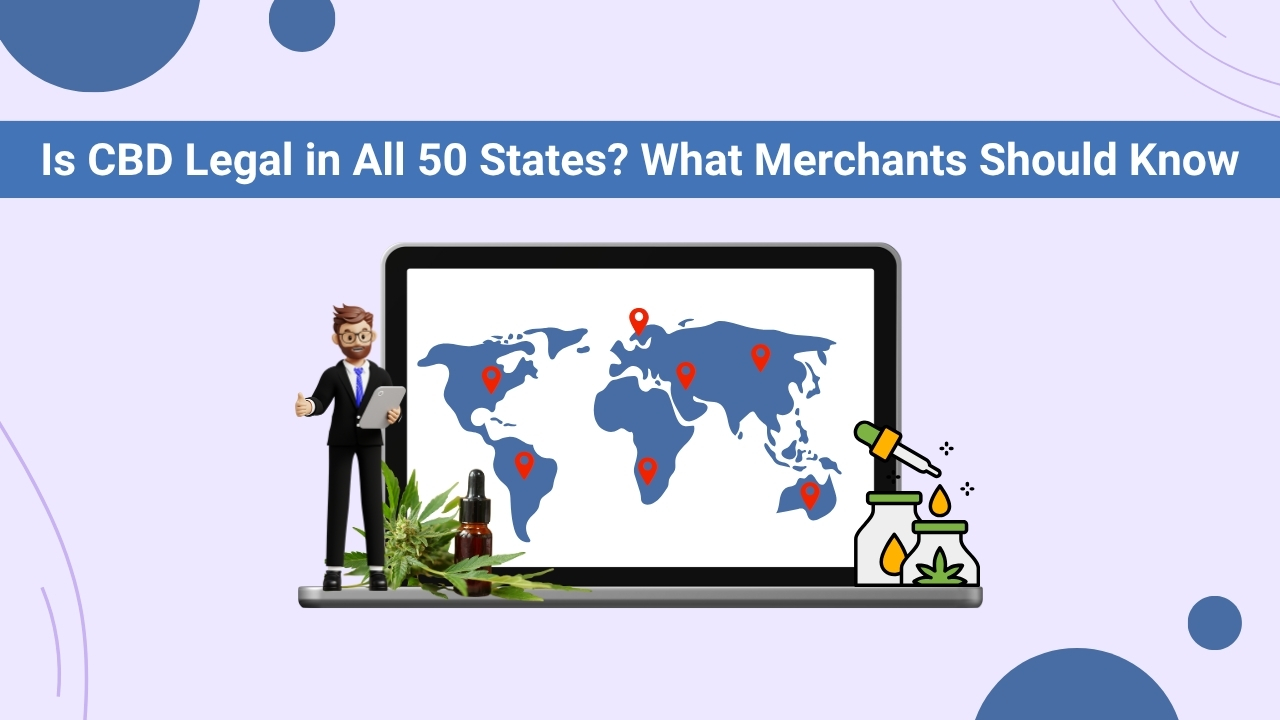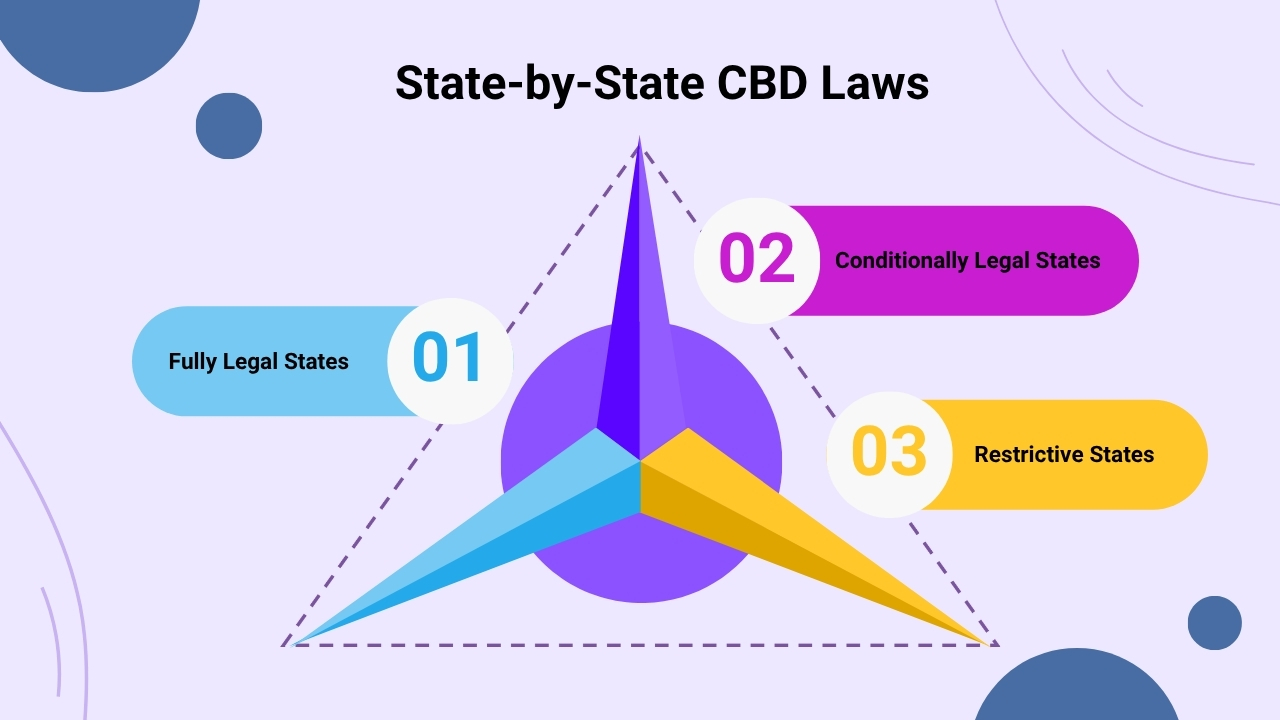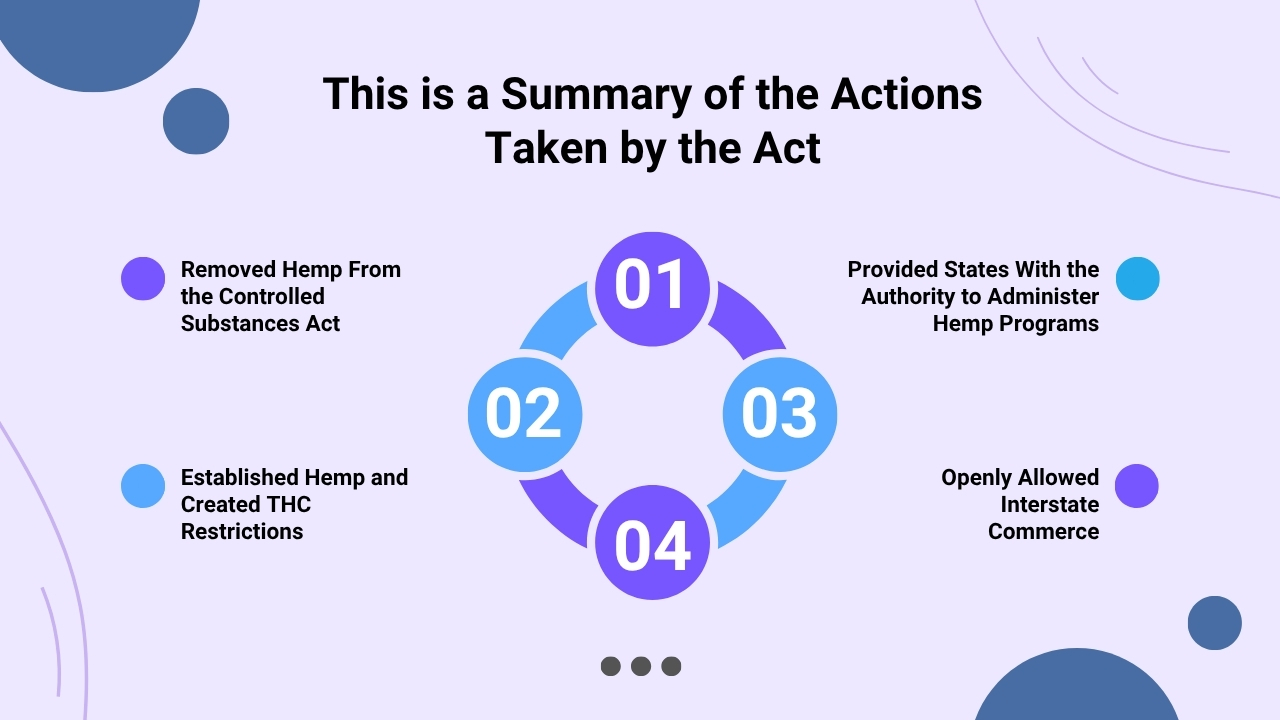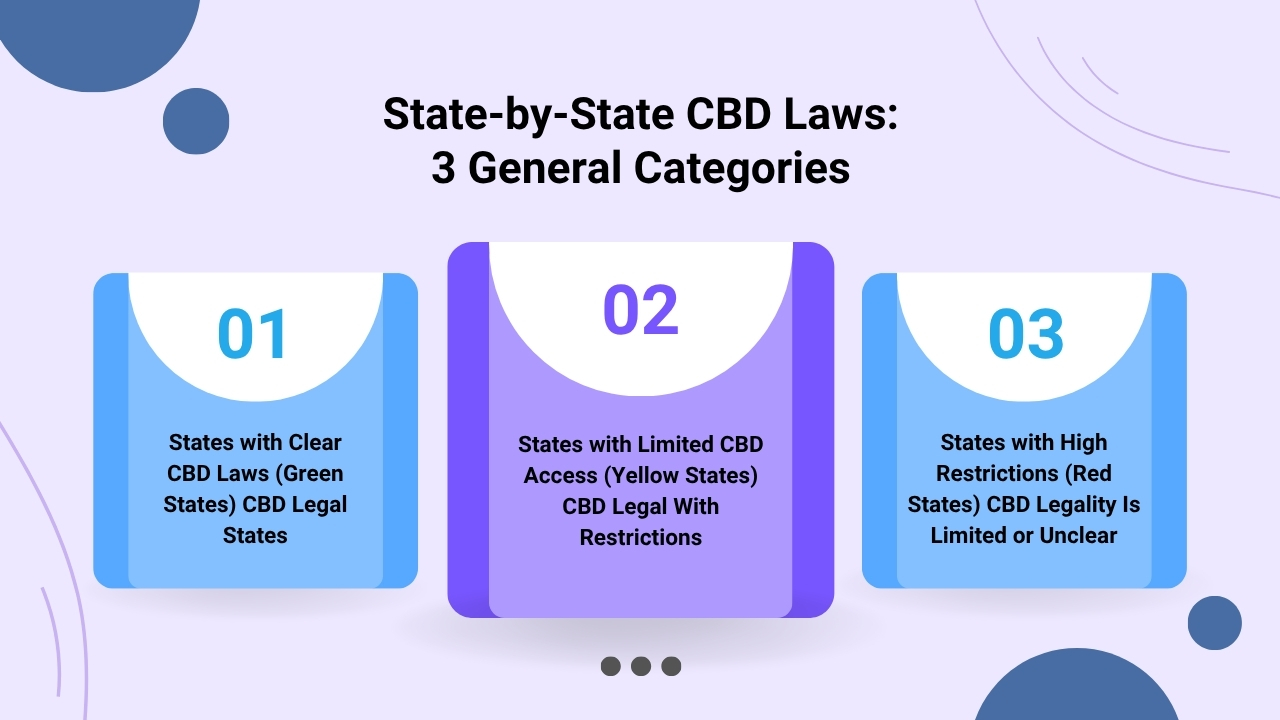
Introduction
Most of the merchants are willing to get into the CBD industry due to the remarkable growth witnessed by the industry since the last several years. Consumer demand for natural health products and the 2018 Farm bill that made hemp legal at a national level will enable the CBD industry to register unprecedented growth over the coming years.
CBD-laced products such as oils, tinctures, gummies, skincare cream, and beverages are already out there in health food stores, cafes, and online retail platforms.
Yet, for business owners or would-be business owners interested in targeting this marketplace, there is a basic question to ask before opening or growing your company: Is CBD legal in all 50 states?
The short response is: Not quite. Whereas federal legislation makes hemp-derived CBD with less than 0.3% THC legal, state laws are really quite different—something legal in one state could be heavily restricted or prohibited somewhere else.
This regulatory puzzle requires CBD sellers to be mindful of state as well as federal laws to prevent expensive errors, legal entanglements, or business disruptions.
CBD Legality in the U.S. is largely controlled by the 2018 Farm Bill, which legalized CBD products from hemp with less than 0.3% THC at the federal level. States can make their own laws, so:
Federal Law: Hemp-derived CBD legal status is only valid if less than 0.3% THC. CBD extracted from marijuana is prohibited at the federal level.
State Laws: Each state in the US has their own set of laws; both marijuana-extracted and hemp-extracted CBD is legal in some states, hemp-extracted CBD is legal in some states, and some states have strict bans or even CBD bans.
CBD legal states include Alaska, Arizona, California, Colorado, Connecticut, Maine, Massachusetts, Michigan, Montana, Nevada, New Jersey, New York, Oregon, Vermont, Virginia, and Washington, and the District of Columbia.
FDA Regulations: In terms of FDA regulations, the agency approved only one CBD product for therapeutic use (Epidiolex), but it regulates CBD as a food additive, a dietary supplement, and an ingredient in health labels.
By this blog we are attempting to bring some light to what the legal landscape for CBD in the United States is today, to outline what separates federal and state laws, and to cover certain details of licensing, labeling, compliance, and payment processing which all CBD traders should have in mind.
Also Read: How to Expand your CBD Business in New Market
Knowledge of Federal CBD Laws
The 2018 Farm Bill
The 2018 Farm Bill legalized hemp-derived CBD products containing no more than 0.3% THC by dry weight at the federal level.
This legislation, known as the 2018 Hemp Farming Act, was enacted as part of the broader 2018 Farm Bill, allowing for the cultivation and sale of industrial hemp, defined as cannabis with less than 0.3% THC on a dry weight basis.
Also Read: How to Get a CBD License
This is a Summary of the Actions Taken by the Act:
1.Removed Hemp From the Controlled Substances Act:
Hemp is no longer considered a Schedule I controlled substance and can be lawfully grown and sold under federal law.
2.Established Hemp and Created THC Restrictions:
Hemp shall have not more than 0.3% THC content to differentiate from marijuana.
3.Provided States With the Authority to Administer Hemp Programs:
States are permitted to send in their own plans for growing hemp for approval by the USDA—or simply opt out. Authorized growers to cultivate hemp for commercial uses.
4.Openly Allowed Interstate Commerce:
Hemp and hemp-based items such as CBD oil are permitted to cross state borders legally—albeit states can continue to have their own laws.
The Hemp Farming Act established the federal legal framework for the contemporary CBD market. Yet it did not supplant state-level jurisdiction.
This means that although CBD is federally legal, state regulations are also important and can differ significantly in their regulation of manufacturing, distribution, and retailing practices.
Also Read: CBD industry trends challenges and future outlook
Is CBD Legal in All 50 States?
Short answer: Not quite. Although CBD is legally allowed in all 50 states at the federal level, every state has its own regulations concerning:
- The origin of the CBD (hemp or marijuana)
- THC level
- Licensing and registration requirements
- Labeling, testing, and marketing regulations
- Let’s drill down further.
While hemp-based CBD is federally legal, states may prohibit or regulate its sale and use. That’s not to say CBD is entirely legal across all 50 states—at least, not quite.
Also Read: Selling CBD Products online
State-by-State CBD Laws: 3 General Categories
1.States with Clear CBD Laws (Green States) CBD Legal States
Certain states such as Colorado, Oregon, and Vermont are entirely CBD-friendly. They permit the sale and utilization of hemp-based CBD with very few restrictions. These states tend to have strong regulatory systems in place, and in fact, it makes it less complicated for the merchants to remain compliant. CBD legal for any purpose: food, supplements, cosmetics.
Also Read: Can you Advertise CBD on Instagram
2.States with Limited CBD Access (Yellow States) CBD Legal With Restrictions
In Texas, Florida, and North Carolina, CBD is legal but with tight regulations on labeling, testing, and THC levels. Some states also demand merchants to register or get a license prior to selling CBD. CBD is legal, but there are limitations—particularly for ingestibles or smokables.
Also Read: How to Start a CBD Dispensary in California
3.States with High Restrictions (Red States) CBD Legality Is Limited or Unclear
A handful of states, such as Idaho and South Dakota, are extremely restrictive.
For instance:
- Idaho only allows CBD products with 0% THC—not even the federally permitted 0.3%.
- South Dakota has varied in CBD position historically, though laws are gradually changing.
- In those states, the sale or possession of CBD products with even a trace of THC can get a merchant into legal trouble.
Also Read: Guide to Start a CBD Business
CBD Laws 2025
1. Hemp-Derived CBD:
Products of CBD extracted from hemp that contain less than 0.3% delta-9 THC are legal nationwide by federal law in the 2018 Farm Bill.
2. FDA Oversight:
The U.S. Food and Drug Administration (FDA) has authorized one CBD-derived medication, Epidiolex, for specific seizure disorders. The FDA prohibits the marketing of CBD as a dietary supplement or its inclusion in food products unless it has received approval.
3. Marijuana-Derived CBD:
CBD from marijuana plants (those with more than 0.3% THC) remains federally illegal, although enforcement is usually limited to interstate commerce and not usually aimed at those in accordance with state regulations.
Also Read: Which Banks Supports CBD Businesses
State-by-State CBD Laws

While hemp-derived CBD is legal on the federal stage, states have established their own legislation:
1.Fully Legal States:
States like California, Colorado, and Illinois have made hemp- and marijuana-derived CBD legal for various uses.
Also Read: CBD Terms of Payment
2.Conditionally Legal States:
In Texas and Georgia, CBD is conditionally legal with certain conditions that usually involve the need for a medical prescription or restricting THC content to levels below certain percentages.
Also Read: How Fast Payouts can Improve your CBD Business Cash Flow
3.Restrictive States:
Idaho and Nebraska are restrictive policy states that only allow 0% THC CBD products.
Also Read: How to Choose the Best CBD Payment Processing Company
It is important to mention local legislation as the legality of purchasing, possessing, and using CBD products is influenced by the laws of a state.
What is the Difference Between Hemp and Marijuana Plants?
Although both hemp and marijuana are members of the Cannabis sativa species, they differ on a legal, chemical, and agricultural level. The point where they diverge is in THC content—but not quite that far.
1. THC Concentration : The Legal Distinction
Hemp can be considered as cannabis with not more than 0.3% dry weight content of THC.Marijuana is cannabis containing greater than 0.3% THC, the active ingredient that leads to a “high.”
That is the 0.3% standard on which the 2018 Farm Bill relies in making the legal distinction between hemp and marijuana subject to federal control.
Also Read: How to Choose the Right CBD Merchant Account
2. Cannabinoid Profile
- Hemp generally will be heavy with CBD (cannabidiol) but light with THC.
- Marijuana is bred with more THC present, but with CBD being less present as well.
Also Read: Innovative Cannabis Marketing Tips
3. Cultivation and Use
Hemp crops are cultivated tall and strong for industrial and health purposes, such as:
- CBD oil
- Clothing and textiles
- Paper and bioplastics
- Building materials (hempcrete)
Marijuana crops are cultivated shorter and bushy for medicinal or recreational purposes, with emphasis on THC-dense flowers.
Also Read: How to Start a CBD Oil Business
4. Difference Between Hemp CBD and Marijuana CBD Laws
Hemp CBD comes from hemp plants that contain no more than 0.3% THC and is federally permitted under the 2018 Farm Bill, subject to state-imposed limitations only.
Marijuana CBD comes from marijuana plants that have more than 0.3% THC, is federally banned, and only is legal in medical or adult use marijuana states, where it is sold openly in licensed establishments with strict regulations.
Also Read: Best Marijuana Marketing Strategies
5. Physical Differences
Subtle, yet there are visual differences:
Hemp plants can reach heights of approximately 15 feet, characterized by their slender leaves and elongated stalks, whereas marijuana plants are generally shorter, more robust, and possess broader leaves along with compact, resin-rich flower buds.
Also Read: CBD Merchant Account Vs Regular Merchant Account
Why There’s Confusion Around CBD?
Even with its growing popularity, CBD (cannabidiol) is perhaps the most poorly misunderstood health product in the United States. The lack of understanding isn’t just with consumers—but with retailers, regulators, and even doctors. But why so much confusion?
Here are the Main Reasons:
1. CBD Federal vs. State Laws Conflict:
The 2018 Farm Bill made hemp-derived CBD federally legal (with ≤ 0.3% THC), but it didn’t preempt state control. Which means:
A few states are in line with federal regulations; others impose additional restrictions or outright prohibit certain types of products.
Local enforcement and interpretation may differ even within a single state. This mismatch in laws creates a patchwork of CBD laws, causing confusion as to what’s permitted where.
Also Read: CBD Terms of Payment
2. Lack of FDA Regulation
Even though CBD is legal at the federal level, the FDA has not approved it for use in foods, drinks, or dietary supplements. No federal standards for standardized dosing and labeling are enforced either.
As a consequence:
- Unregulated products overwhelm the marketplace
- Customers are exposed to uneven potency and quality
- Traders are in the dark about what’s compliant
- This regulatory gap opens the door to misinformation and legal ambiguities.
Also Read: Secure Payment Processing for CBD Ecommerce
3. Association with Marijuana
CBD comes from the cannabis plant, which also produces THC—the active ingredient in marijuana. Although hemp-derived CBD won’t get you high, many people get the two confused anyway.
This stigma leads to:
- Reluctance from mainstream retailers
- Ambiguity in law enforcement and banking institutions
- Misconceptions about safety and legality among the public
- The distinction between CBD and marijuana is not clear to many, even with significant differences in chemical composition and legality.
Also Read: How to Market Cannabis
4. Inconsistent Retail Policies
Some big box stores (such as CVS or Walgreens) offer CBD topicals but not edibles. Some won’t even sell CBD at all. Websites such as Amazon technically prohibit CBD but continue to host hemp products that can include trace cannabinoids.
This inconsistency results in:
- Mistrust by consumers
- Merchants’ confusion regarding where to advertise or sell
- Misunderstandings of what’s truly legal to sell
Also Read: Can You Sell CBD on Tik Tok
5. Quickly Changing Laws
CBD laws continue to evolve, particularly at the state level. What is legal today may not be tomorrow—and vice versa.
Merchants have to constantly:
- Track legal changes
- Tweak product lines
- Speak clearly with customers
- Without clear, consistent rules, uncertainty remains for all parties involved.
The uncertainty surrounding CBD is caused by conflicting legislation, lack of federal regulation, public confusion, and a constantly changing legal environment. For traders, this translates into keeping up to date, taking advice from legal professionals, and being completely transparent in everything from labeling to promotion.
Also Read: The CBD Industry Trends Challenges and Future Outlook
What CBD Merchants Should Know About CBD Legislation 2025?
Selling CBD items in today’s market holds enormous potential—yet it also holds some very important legal responsibilities. In this in-depth guide, we examine everything CBD merchants must know about staying compliant with federal and state laws in 2025.
From discovering hemp-based versus marijuana-based CBD differences, to being in line with FDA regulations, labeling laws, and state-by-state bans, this article is a one-stop legal resource for CBD entrepreneurs.
We also address some of the essential topics such as third-party audit, COA requirements, high-risk payment processing like CBD Merchant Solutions, and new advertising and shipping laws impacting CBD companies on a daily basis.
Regardless of whether you are launching a CBD business or are looking to extend your existing venture, this guide will help guide you away from costly compliance pitfalls and keep your business legally in check.
What CBD Merchants Should Understand?
If you’re launching a CBD retail outlet or a CBD online business, here are the things that you should be taking into account:
1. Meet State Regulations Where You Sell
If you’re shipping nationwide, you have to know about CBD regulations in every state you do business in. Some states disallow some type of product (e.g., edibles), while others call for registration or testing papers.
Also Read: The Ultimate Guide to CBD Social Media Marketing
2. Mark Products Properly
Proper labeling is critical to meet FDA and state regulations. Your labels must contain:
- THC content (must be ≤ 0.3%)
- Batch or lot number
- Ingredient list
- Manufacturer information
- QR code linking to third-party lab results (COAs)
3. Get Licenses and Registrations:
Some states mandate:
- A CBD retailer license
- Hemp processor registration
- Health department approvals (particularly for edibles)
- Check your state’s agriculture or health department for details.
4. Use a CBD-Friendly Payment Processor
CBD is deemed high-risk by the majority of standard processors. Select a CBD friendly payment processor like CBD Merchant Solutions that understands the industry to prevent account shutdowns or freezes.
Also Read: Why Every CBD Business Needs a Customized POS System
5. Be Current and Responsive
CBD legislation is changing. Read industry newsletters, have a CBD compliance attorney on retainer, and monitor FDA guidelines to remain ahead of regulatory updates.
Also Read: How to Protect Your CBD Business From Payment Processor Shutdowns
How to Remain Compliant Selling CBD (2025)?
Legally selling CBD products in the United States requires more than it takes to grow good hemp — it requires zealous adherence to a complex, ever-evolving federal, state, and local regulatory system.
As a merchant of CBD products, compliance isn’t just a matter of keeping out of jail or staying in business — it’s about building trust, protecting your brand, and securing long-term success.
In this guide, we guide you through the most important steps to remain compliant when selling CBD in 2025:
1. Sell Only Federally Legal, Hemp-Derived CBD:
To remain compliant, all CBD you sell should be industrial hemp-derived, and not marijuana. Under the 2018 Farm Bill:
- Hemp must have no more than 0.3% delta-9 THC on a dry weight basis.
- Products with greater THC content are classified as marijuana and are still federally prohibited unless being sold under a state-licensed cannabis program.
- Action: Source CBD from U.S. hemp farmers who are licensed and demand documentation of THC compliance.
Also Read: CBD Advertising Best Practices
2. Third-Party Lab Testing (COAs) for Every Batch:
Independent lab analysis is essential for legality and consumer trust.
Labs need to test for:
- CBD & THC potency
- Heavy metals
- Pesticides
- Residual solvents & microbes
Results need to be documented in a Certificate of Analysis (COA).
Action: Publish COAs on your website or on packaging via QR codes for transparency.
Also Read: How to Integrate CBD Payment Solution With Ecommerce Platforms
3. Accurate Product Labeling and Packaging:
A label on a CBD product is perhaps the most critical compliance mechanism. It must contain:
Must contain:
- Total CBD and per-serving amount
- THC content
- Full list of ingredients
- Batch number & expiration date
- Warning statements (e.g., “Not FDA-approved”)
Never contain unsubstantiated health claims, such as “relieves anxiety” or “treats inflammation.” This might invoke FDA enforcement.
Action: Have a compliance specialist check your labels prior to launch.
4. Comply with FDA Regulations:
The FDA has not approved the majority of over-the-counter CBD products. Therefore:
- You are not legally permitted to sell CBD as a dietary supplement or food/beverage additive (apart from approved).
- You should not make medical claims or include any messaging that suggests treatment, cure, or disease prevention.
- Action: Continue with educational, not medicinal, marketing language. Lifestyle and wellness messaging is preferred.
5. Familiarize Yourself With State Regulations:
Although CBD from hemp is federally legal, each state has its own regulations, such as:
- Product type prohibitions (e.g., no gummies, no vapes)
- Retailing licensing or product registration
- Restrictions on where/how to sell CBD (e.g., in food or cosmetics)
- Action: Learn CBD legislation in all states where you sell or ship.
6. Deal With CBD-Supportive Payment Processors:
Since CBD is still “high-risk,” many payment processors won’t take CBD businesses. Others will charge:
- Increased transaction fees (3%–6%)
- Ask for additional documentation (licenses, COAs, supply chain information)
- Action: Utilize processors that deal with CBD, including:
- Square (CBD beta program)
- Authorize .Net (via high-risk merchant accounts)
- PayKings, Easy Pay Direct
7. Ship Legally and Responsibly: Can you ship CBD to all 50 states?:
You can ship CBD across state lines — but not every state permits every product. Certain states (like Idaho and South Dakota) prohibit or restrict specific products.
Verify each state’s product and shipping laws.
Hire carriers like USPS or UPS, who allow shipments of hemp-derived CBD (with documentation).
8. CBD Advertising Restrictions:
The majority of major platforms (Google Ads, Meta, TikTok) either prohibit or limit CBD advertising. CBD advertising restrictions include avoiding health claims, complying with strict platform policies, appealing to adults only, and abiding by federal and state laws, as most of the leading platforms place bans or restrictions on CBD advertising.
To remain in compliance:
- Avoid paying for claims made on CBD.
- Apply organic tactics such as:
- SEO blog content
- Email marketing
- Educational video or influencer collaborations
- Action: Make all messaging accurate and avoid suggesting medical benefits.
9. Stay Informed about Legal Developments:
CBD laws constantly change. Legal today may no longer be so tomorrow.
Action:
- Subscribe to industry newsletters (e.g., Hemp Industry Daily, NORML updates).
- Refer to a CBD-specialized attorney.
- Re-assess compliance each quarter or introducing new products.
Common Mistakes to Avoid:
- Shipping CBD into states where it’s illegal
- Selling products with false THC content
- Utilizing unverified payment processors such as PayPal or Stripe without permission
- Not providing third-party lab results
- Believing federal legality is the same as nationwide legality
Conclusion: Is CBD Legal Throughout All 50 States?
The response to the inquiry “Is CBD legal in all 50 states?” cannot be reduced to a straightforward yes or no. Although the Hemp Farming Act of 2018 federally legalized CBD, this does not imply that it is universally legal without any conditions.
In reality, the legality of CBD varies significantly from one state to another, particularly regarding its production, marketing, sale, and consumption. For CBD retailers, it is essential to understand that federal legalization does not equate to unrestricted access. The truth is that:
1. State CBD laws can have stringent testing, labeling, and THC content regulations.
2. There are states that permit selling CBD but only within medical cannabis programs or with a license.
3. A handful of states—such as Idaho and South Dakota—continue to apply narrow interpretations of CBD legality, especially with regards to THC thresholds.
4. Interstate commerce, although federally allowed, may still be influenced by state enforcement and product limitations at state lines.
To conduct business safely and successfully, traders need to adopt a compliance-first approach. This entails:
1. Monitoring CBD legislation by state and staying current on legislative updates.
2. Dealing with trusted CBD suppliers who offer full-panel third-party testing of products.
3. Utilizing CBD-friendly payment processing such as CBD Merchant Solutions, helps to eliminate the possibility of account freeze or chargebacks.
4. Ensuring all marketing materials and packaging meet FDA guidelines, particularly by refraining from untested health claims.
5. Seeking legal advice or compliance specialists for high-risk states.
While the CBD market has incredible potential, it also requires responsibility. Merchants who are open, compliant, and inform their customers will be most likely to avoid legal issues as well as gain long-term loyalty and trust in the competitive marketplace.
In short, CBD is legal—but if you play nice. Understanding the difference between federal law and state-specific CBD regulations is the first step toward making a legally sound and profitable CBD business.
Frequently Asked Questions (FAQs)
1. Is CBD legal in all 50 states?
Hemp-derived CBD (with 0.3% THC or less) is federally legal, but each state has its own regulations. Some states limit specific types of CBD products such as edibles or have registration requirements for sellers.
2. What is the federal law on CBD?
The 2018 Farm Bill legalized federally CBD derived from hemp, taking hemp off the Controlled Substances Act, but reserving for the states the right to regulate independent products of CBD.
3. Are CBD products restricted in some states?
Yes. There are states such as Idaho, Nebraska, and South Dakota, which have stricter rules. Idaho, for instance, only allows zero-THC CBD, and South Dakota has changed legislation but still retains some restrictions.
4. Can I purchase CBD online and have it sent to my state?
Generally, yes — but it varies according to your state’s laws. Some states prohibit the kind of CBD products which can be sent, particularly edibles or full-spectrum ones.
5. Is full spectrum CBD legal everywhere?
No, not everywhere. Full spectrum CBD (with trace THC) is prohibited in states such as Idaho and Kansas that mandate CBD products to have 0.0% THC.
6. Does the FDA regulate CBD products?
Yes, but not entirely. The FDA has not approved CBD as a dietary supplement or food additive. They primarily regulate labeling, medical claims, and some therapeutic applications.
7. Can businesses sell CBD without a license?
It varies by state. Some states require CBD manufacturers and retailers to register, obtain licenses, or comply with specific testing and labeling standards.
8. Is CBD from marijuana legal in all states?
No. CBD from marijuana (cannabis with more than 0.3% THC) is legal only in states where marijuana is legalized for medical or recreational purposes.


